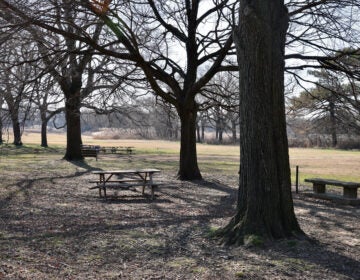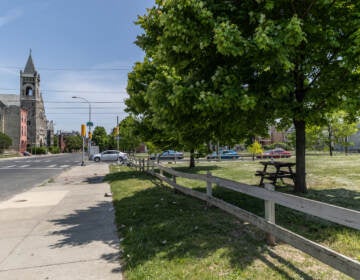Zoning, location and crime: How businesses interact with their neighborhoods
This is the first of a two-part look at three Northeast Philadelphia business corridors, the areas and around them and how those businesses impact their communities.
Jeff Holden is the owner of the Lawncrest Family Barber Shop on the 300-block of Devereaux Street in Lawncrest. He opened his barber shop along a residential block two years ago, and said he didn’t experience any issues with the process.
“My business was previously a barber shop, so I just had to check before going through the city,” Holden said.
General Contractor Simon Kim experienced a similar situation: “I just went through the city.”
The A-1 Glass and Metal Co. along the 6300-block of Palmetto Street also was already zoned as a commercial property and only needed to go through the City of Philadelphia to open his business at that site.
“If a business itself existed before zoning, that business is grandfathered in, or someone can get a variance from the zoning board,” explained Ian Litwin, a Northeast community planner with the Philadelphia City Planning Commission.
More say for civic associations
The new zoning plan, set to take effect later this year, will give neighborhood civic associations more responsibility for zoning in their communities, allowing association members to learn what development plans are in the works in their immediate neighborhood before work begins. Prospective business owners will need the approval of their registered community organization before developing.
Under the new zoning laws, any new business that falls under the same category as the old one on the property will not have to go through zoning to open.
For example, if a bar on a residential street closes and sits vacant for less than three years, the property can reopen as a bar, even if the neighborhood has been re-zoned as residential. If a business property sits vacant for more than three years, then it will become re-zoned along with the rest of the block.
Though Rising Sun Avenue is Lawncrest’s main business corridor, many small business owners operate out of storefronts on residential streets.
It’s an issue the Lawncrest Community Association zoning officers deal with frequently. At the May 2012 meeting, the LCA voiced approval for Chandler Le to operate his accounting business out of the first floor on his home on the 500-block of Levick Street. Though LCA members were sympathetic with Le’s desire to keep his family close and run a cost-effective business, many worried about increased traffic on the residential block. Ultimately, the membership sent Le to the Zoning Board of Adjustment with an approval.
Businesses and their corridor issues
Rodriguez Grocery on the 5700-block of Colgate Street serves its neighbors food and other household items. The store stays busy, with neighboring residents coming in and out for their items. Corner stores like Rodriguez Grocery serve as a lifeline for people living in Philadelphia, providing the necessities a household needs in between trips to a supermarket.
But just because the store is on a residential street, doesn’t mean Rodriguez Grocery is immune to the problems some business corridors experience. The store has nine security cameras around it, and the cashier sits behind bullet-proof glass.
Lisa Karakasidis of Larry’s Famous Steaks on the 6400-block of Rising Sun Avenue is used to dealing with the issues that come with a neighborhood’s changing dynamics.
“We get everything, from the rude customers and riffraff, to business people, to families and older people,” she said of her customers. “We don’t just get one type around here; it’s everything.”
And it was teenagers who stole the charity box from the store.
“They were kids, kids,” Karakasidis said of the thieves. “I wouldn’t call them criminals. Four teenage boys ripped off a charity box and tried to break it on the porch.”
In the video below, Lawncrest business owners discuss security concerns at their Rising Sun Avenue storefronts:
But being a business owner in a residential area isn’t always a bad thing.
Holden, the barber shop owner, said he think it’s great to operate a business on a residential street. He’s got friendly neighbors, many of whom visit his shop.
“A lot [of customers] either live around here or used to live around here,” Holden said. “About 70 percent of my customers come from the area.”
Laura Robb is a student reporting for Philadelphia Neighborhoods, the publication of Temple University’s Multimedia Urban Reporting Lab.
WHYY is your source for fact-based, in-depth journalism and information. As a nonprofit organization, we rely on financial support from readers like you. Please give today.





